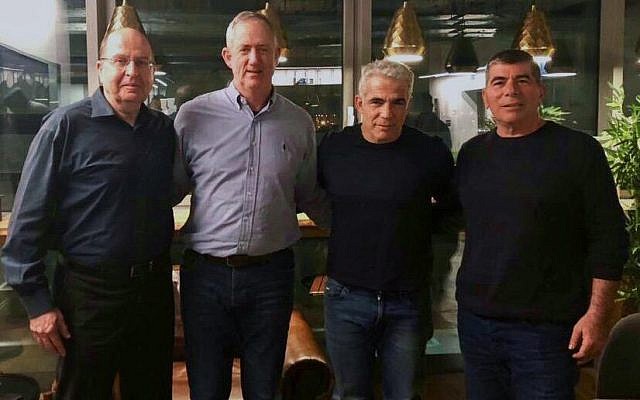
After marathon, all-night talks, the leaders of the two top-polling centrist parties, Benny Gantz and Yair Lapid, announced Thursday that they had agreed to merge their party lists to challenge Prime Minister Benjamin Netanyahu’s frontrunning Likud in the upcoming elections.
The announcement, just after dawn, said that Gantz’s Israel Resilience party and Lapid’s Yesh Atid had agreed that should they win and form a government, Gantz would be prime minister first for a period of two and a half years, and then Lapid would take over.
The announcement also said that popular former IDF chief of staff Gabi Ashkenazi had agreed to join the united list in the fourth slot in the wake of the merger, in a move intended to further add to their broad centrist appeal.
“From a feeling of national responsibility, it was decided by Benny Gantz, Yair Lapid and (Moshe) Ya’alon to create a united list that will become the new governing party of Israel,” Gantz and Lapid said in a joint statement.
Ya’alon, another former IDF chief of staff and a former Likud defense minister, had already united his Telem party with Gantz.
“This new governing party will present a new team of security and social leaders that will ensure the security of the nation and reunite the fractured elements of Israeli society,” the statement said.
The statement announced the rotation agreement and said Ashkenazi had decided to join due to the “pivotal moment and the national task at hand.”
The alliance injects greater competition into April’s elections. “For the first time since 2009, we have a competitive race for the premiership and this is the result of the emergence of this new centrist force,” said Yohanan Plesner, a former lawmaker and president of the non-partisan Israel Democracy Institute.
“There are now, as a result of this unification, two, I would say, legitimate major parties … (but) it’s not a done deal,” Plesner said. “I think Netanyahu is still more likely to win and to emerge as prime minister at the end of this election campaign, but it is a competitive race.” READ MORE